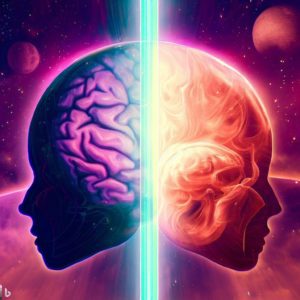Are you ready to embark on a spiritual journey and unlock the secrets of the mystical vision? We will explore the concept of the narrow path mentioned by Jesus in the Bible and compare it to the Buddha’s middle path. We will delve into the symbolism of the transfiguration experience of Jesus and the apostles, diving into the balance between the logical and emotional mind, as represented by Moses and the prophets.
The Narrow Path in Christianity and Buddhism
The concept of the narrow path is frequently mentioned in the Christian Bible, with Jesus emphasizing its importance for spiritual growth. The narrow path is often thought to be synonymous with being a Christian, but there is a deeper meaning to it. Interestingly, the concept of the narrow path is remarkably like the Buddha’s middle path, which lies between extreme asceticism and hedonism.
While both paths seem similar, they have different focuses. The Buddha’s middle path is more about finding a balance between indulging in worldly pleasures and extreme self-denial, while the narrow path in Christianity is about achieving equilibrium between the logical and emotional aspects of the mind.
The Transfiguration Experience: Symbolism and Significance
One of the most famous biblical stories that provide insight into the narrow path is the transfiguration experience of Jesus and the apostles. In this story, Jesus is seen with Moses and Elijah on either side of him. Moses represents the logical and analytical mind, while Elijah, a prophet, represents the emotional and spiritual mind.
The narrow path, therefore, is about achieving balance and equilibrium between the logical and emotional aspects of the mind. This balance is crucial for spiritual growth and enlightenment, as it allows individuals to fully embrace their human nature and transcend their limitations.
Achieving Mental Equilibrium: The Key to Spiritual Growth
The idea of achieving mental equilibrium is not unique to Christianity. In fact, it is a central tenet in many esoteric and occult teachings, including the concept of mental alchemy. Mental alchemy involves balancing emotional states and thought processes to achieve inner equilibrium and harmony.
This idea of mental equilibrium is also seen in the teachings of St. Paul in the Christian Bible. He encourages wives to be submissive to their husbands while urging husbands to love their wives as Christ loves the church. This passage highlights the importance of balancing the male (logical) and female (emotional) aspects of the mind for spiritual growth and enlightenment.
Embracing the Narrow Path: The Journey to Eternal Life
The narrow path is the key to eternal life, fullness of life, and adoption as a child of God. By understanding the profound concepts of the narrow path and achieving equilibrium between the logical and emotional aspects of the mind, individuals can deepen their understanding of mystical experiences and vision. This journey is essential for spiritual growth and enlightenment, allowing individuals to explore and embrace their true spiritual nature.
In conclusion, the narrow path is a vital concept in Christianity and represents the balance between the logical and emotional aspects of the mind. By understanding this concept and striving to achieve mental equilibrium, individuals can unlock the secrets of the mystical vision and experience spiritual growth and enlightenment.




